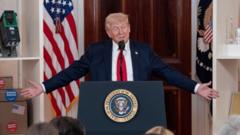The US economy experienced its first contraction in three years, leading President Trump to ask for more time to address the situation, linking the downturn to actions taken by his predecessor.
Trump Appeals for Patience as US Economy Contraction Sparks Concerns

Trump Appeals for Patience as US Economy Contraction Sparks Concerns
Former President seeks understanding from business leaders amid GDP decline and ongoing trade issues.
President Donald Trump addressed a gathering of business leaders at the White House this week, urging them to be patient as the US economy faces troubling signs. The latest data from the Commerce Department reveals a contraction of 0.3% in gross domestic product (GDP) for the first time in three years, a stark contrast to the 2.4% growth reported in the previous quarter. With fears of recession looming, Trump attributed the downturn to preemptive stockpiling of imports by companies due to anticipated tariffs.
During the event, he argued that the reported figures were misleading, assuring attendees that $8 trillion in inward investments have been promised, which he believes will bolster the manufacturing sector in the U.S. Trump’s remarks came as he reached a milestone of 100 days in office, amid growing public dissatisfaction with his economic management.
In a statement that stirred controversy, Trump claimed, "This is Biden's economy because we took over on January 20th," urging that more time is needed to implement strategies to overcome economic challenges. His remarks drew sharp rebuttals from Democratic leaders, including House Minority Leader Hakeem Jeffries, who labeled the current economic situation as “Trump's economy” and a “failed economy.”
In his address, Trump highlighted potential investments in infrastructure, technology, and healthcare while introducing CEOs from major corporations like Hyundai, Toyota, and Johnson & Johnson. He also pushed for the passage of his proposed tax bill, which aims for substantial tax cuts and spending reductions but faces pushbacks from both Democrats and certain Republicans.
Earlier in the day, during a television appearance with his cabinet, Trump downplayed fears of product shortages due to decreased trade with China, suggesting consumers might simply have to accept slightly higher prices for fewer items, emphasizing, "Well, maybe the children will have to have two dolls instead of 30 dolls."
The administration's tariffs have significantly disrupted trade dynamics, with Trump imposing a 10% levy on a wide range of imports and escalating tariffs on Chinese goods, sometimes reaching as high as 245%. Relations with China continue to sour, as both nations engage in a trade war marked by retaliatory tariffs.
As Trump navigates these economic hurdles, the administration must contend with both internal political challenges and the economic realities faced by Americans. The response and recovery from this economic contraction will be pivotal for the former president's legacy and influence moving forward.
During the event, he argued that the reported figures were misleading, assuring attendees that $8 trillion in inward investments have been promised, which he believes will bolster the manufacturing sector in the U.S. Trump’s remarks came as he reached a milestone of 100 days in office, amid growing public dissatisfaction with his economic management.
In a statement that stirred controversy, Trump claimed, "This is Biden's economy because we took over on January 20th," urging that more time is needed to implement strategies to overcome economic challenges. His remarks drew sharp rebuttals from Democratic leaders, including House Minority Leader Hakeem Jeffries, who labeled the current economic situation as “Trump's economy” and a “failed economy.”
In his address, Trump highlighted potential investments in infrastructure, technology, and healthcare while introducing CEOs from major corporations like Hyundai, Toyota, and Johnson & Johnson. He also pushed for the passage of his proposed tax bill, which aims for substantial tax cuts and spending reductions but faces pushbacks from both Democrats and certain Republicans.
Earlier in the day, during a television appearance with his cabinet, Trump downplayed fears of product shortages due to decreased trade with China, suggesting consumers might simply have to accept slightly higher prices for fewer items, emphasizing, "Well, maybe the children will have to have two dolls instead of 30 dolls."
The administration's tariffs have significantly disrupted trade dynamics, with Trump imposing a 10% levy on a wide range of imports and escalating tariffs on Chinese goods, sometimes reaching as high as 245%. Relations with China continue to sour, as both nations engage in a trade war marked by retaliatory tariffs.
As Trump navigates these economic hurdles, the administration must contend with both internal political challenges and the economic realities faced by Americans. The response and recovery from this economic contraction will be pivotal for the former president's legacy and influence moving forward.





















